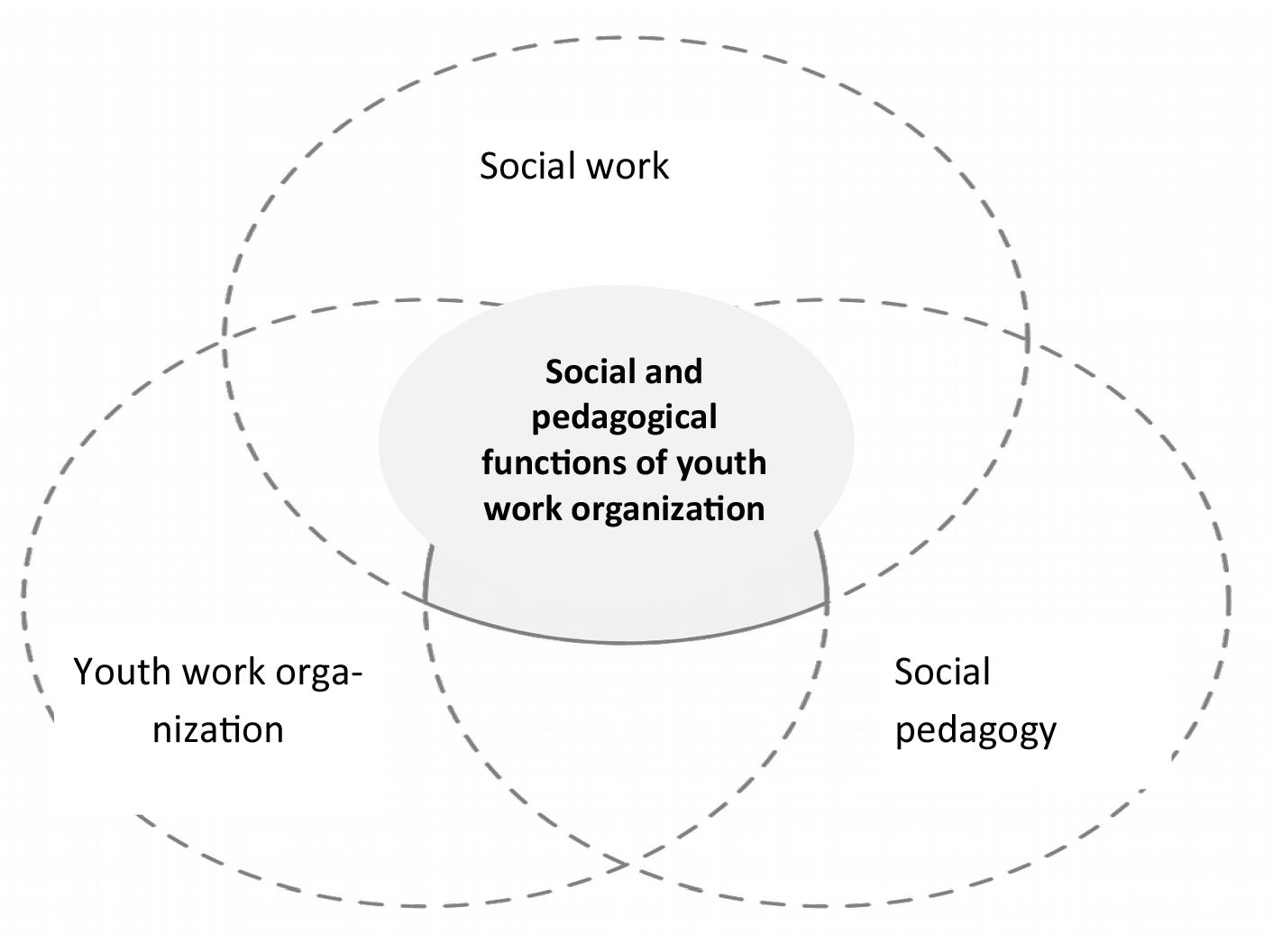
8 minute read
6. L epeshev Dmitry, Viktoria Zakhlebayeva
scientific journal of the modern education & research institute • The Kingdom of Belgium
SOCIAL AND PEDA GOGICAL FUNCTIONS OF THE OR GANI ZER OF YOUTH WOR K
Advertisement
Viktoria akhlebayeva (ivanchenko-v@mail.ru) Dmitry epeshev (d_lepeshev@mail.ru)

Kokshetau bai Myrzakhmetov niversity
bstract

The problems and prospects for the development of youth work are discussed in this article. The authors use the existing international baggage of scientific and theoretical approaches, analysis of existing practical experiences in the presented article and offer to consider youth as an object of social work taking into account the changing world.
Keyword. Youth, youth work, social problems of youth, socialization of youth.
In the twentieth century, many illusory myths about young people were created, on the one hand idealizing, and on the other – negatively assessing the life and behavior of the younger generations in general. But to predict present and future processes requires a strictly scientific approach to youth problems, knowledge of the real picture, a deep study of interests and life plans, value orientations and real behavior of young people, taking into account all the specific historical and social conditions of their socialization.
The future of the country is largely determined not only by what kind of education young people will receive today, but how successfully they integrate into the system of public relations. The socialization and maturation of today’s young people coincides in time with the process of modernization of all aspects of social life. In these conditions, the state youth policy of the Republic of Kazakhstan is being formed. However, any concept can remain on paper if the mechanism for its implementation is not clearly thought out, financial, economic and organizational and personnel bases for ensuring the assigned tasks are not created. In this case we are talking about the professional training of specialists in the field of youth work.
Kokshetau Abai Myrzakhmetov university in course of realization of the state scientific grant project of the Committee of science of the Ministry of education and science of the Republic of Kazakhstan on: «Yunogogics: theory and practice of the youth work in the conditions of the public consciousness modernization» project in the framework of the specialized programme of «Scientific basis» of «Mangilik El» ( education of the XXI century»), brought a proposal of the MES of the RK to introduce an experimental specialty «Social care teacher– facilitator of youth work» on the basis of KU named after A. Myrzakhmetov. The introduction of the specialty will make it possible to train highly professional specialists for the civil service and the education system to work with the younger generation of Kazakhstan people.
Youth work is a systemically organized activity of a subject, in relation to youth, which is carried out socially or professionally. Professional work with young people is carried out by special personnel, whose appointment and complex of professional tasks depend on state priorities and society’s attitude towards young people. Organizers of youth work act as a special staff [1, 167].
Work with youth in Kazakhstan as a social and pedagogical phenomenon is at the stage of passing through several stages of development, the change of which will be due to a change in its subjects, their status, orientation and main types of activity.
The period of 1991-2004 is characterized by the legislative consolidation of the state youth policy in Kazakhstan and the structural units responsible for its implementation. A feature of this period was the development of youth policy, taking into account your world trends in the youth sphere. At this time, a large number of young people appear who find themselves in a difficult life situation caused by uncertainty, instability of the development of society and economic crises. Specialists in social work and social educators worked with young people. However, at the moment we do not have specialists working specifically with young people (with special education) [2, 28].
A social worker acts as a professional teacher of society, designed to provide a pedagogical component in the general, interdepartmental system of social services, the pedagogical feasibility of social work carried out by various institutions, organizations, foundations and sponsors, achieving the main thing – its focus on activating the subject position of every young person, youth as social community as a whole.
If we turn to the division of the concepts of «social worker» and «social care teacher» given by A.N. Teslenko and M.I. Rozhkov, the following should be noted: if a social worker specializes in working with dissocialized youth (victims of socialization), then a social care teacher works with normal youth in an open society. Unlike a social care teacher and a social worker, the activities of a youth work organizer are directed not at an individual young person with his or her interests and needs, but at formal and informal groups of young people and organizations created in these social services (Fig. 1)

Figure 1. he system of social services that determine the main social and pedagogical functions of the organizer of youth work
The following functions are clearly distinguished in the youth work system:
Diagnostic. It as if makes a «social diagnosis», studies the psychological and age characteristics, abilities of a young person, delves into the world of his interests, social circle, living conditions, reveals positive and negative influences, problems.
Organizational. Organizes social activities, initiative, creativity; affects the content of leisure, helps in employment, vocational guidance and adaptation, the activities of adolescent and youth associations, affects the interaction of medical, educational, legal, cultural and sports institutions, public and state institutions in the system of social services.
Prognostic. Participates in programming, forecasting and designing the process of social development of a specific micro-society, the activities of various institutions of youth socialization.
Preventive and prophylactic, social and therapeutic. It takes into account and activates the social and legal, legal, psychological mechanisms for preventing and overcoming the negative influences of society on the individual, organizes the provision of social and therapeutic assistance to young people who are victims of desocialization, and ensures the protection of their rights.
Organizational and communicative. Promotes the inclusion of a wide pedagogical community in social work with young people, in joint work and leisure, business and personal contacts, focuses information and establishes interaction between various social institutions in their work with youth.
Security and protection. Uses the existing arsenal of legal norms to protect the rights and interests of clients, promotes the use of measures of state coercion and the implementation of legal responsibility in relation to persons who allow direct or indirect unlawful influences against young people [1, 37].
In this regard, it is of great importance to combine the main functions of the work of the above three special services for working with youth (Table 1) and to single out the main social and pedagogical functions of the organizer of youth work in one general channel.
For this purpose it is required to supplement the above list of functions, taking into account the social and pedagogical activities of the organizer of youth work.
Thus, the additional functions that are part of the social and pedagogical are: educational, coordinating, analytical and methodological.
Table 1. Description of additional social and pedagogical functions of the organizer of youth work
Functions
Educational and educational
Coordinating
Analytical
Methodical Content
Conducting vocational guidance discussions with students; providing a targeted pedagogical influence on the behavior and activities of children and youth, seeks to fully use in the educational process the means and capabilities of social institutions, the capabilities of the individual himself as an active subject of the educational process; conducting social and pedagogical work with parents, managing the interaction of parents, teachers and pupils; consultations for parents on children’s problems
Coordination of the work of a youth (children’s) creative team, a sports and health, patriotic, scientific and technical, tourist association, an interest club, a public organization, and other youth (children’s) associations. Coordination of the activities of children’s and youth public associations and organiza- tions in the framework of youth policy, analysis of the effectiveness and development of this activity. Coordination of the activities of youth public associations, youth and student self-government bodies through holding exhibitions and fairs for the presentation of socially significant projects, training seminars on the focus of projects, participation in competitions for the implementation of grants, and other forms.
Definition and analysis of social factors, their orientation and influence on the personality; identification of its «problem field»; assessment of the characteristics of human activity; identifying the causes of deviant behavior; study of the causes of social disadvantage of families.
Development of materials on education problems; documents that ensure the imple- mentation of educational programs, taking into account the modern requirements of social pedagogy. Together with children, it participates in the development of social projects. Implementation of educational activities on social and pedagogical problems arising in the activities of the association.
Summarizing the above, the main social and pedagogical functions of the organizer of youth work as a social care teacher (social worker) are outlined.
Today, large-scale changes taking place in our country have led to serious transformations of social institutions. There is an increase in delinquency, unemployment, a decline in the level and quality of life of
the population. There is no clearly defined place and role of youth in the modern structure of society; the mechanisms of socialization, value attitudes and lifestyle strategies have undergone significant changes.
Thus, in the current situation, young people are socially disoriented and require close attention from specialists in organizing work with youth. All this requires the training of professional personnel in the field of work with youth, who will offer new, effective approaches and main directions of work for this age group.
eferences

1.
2. 3.
4.
5. Teslenko A.N., Rozhkov M.I. Yunogogics: theory and practice of youth work. Monograph. – Kokshetau: Kokshetau University named after Abai Myrzakhmetov, 2019, 295 p. Shakurova M.V. Methodology and technology of the work of a social teacher. – M., 2002. Sheptenko P.A., Voronina G.A. Methodology and technology of the work of a social teacher. – M., 2001. Ananyev B. G. Human being and society. The socialization problems of an individual: Collection of articles. Leningrad: The publishing house of Leningrad University, 1971, pp. 144–150. URL: https://elibrary.ru/author_items.asp?authorid=499371&pubrole=100&show_refs=1&show_ option=0 (In Russian)/ Parygin B. D. The basis of the social and psychological theory. Methodology and history of psychology, 2007, vol. 2, no. 2, pp. 40–53. URL: https://elibrary.ru/item.asp?id=19011606 (In Russian)/



